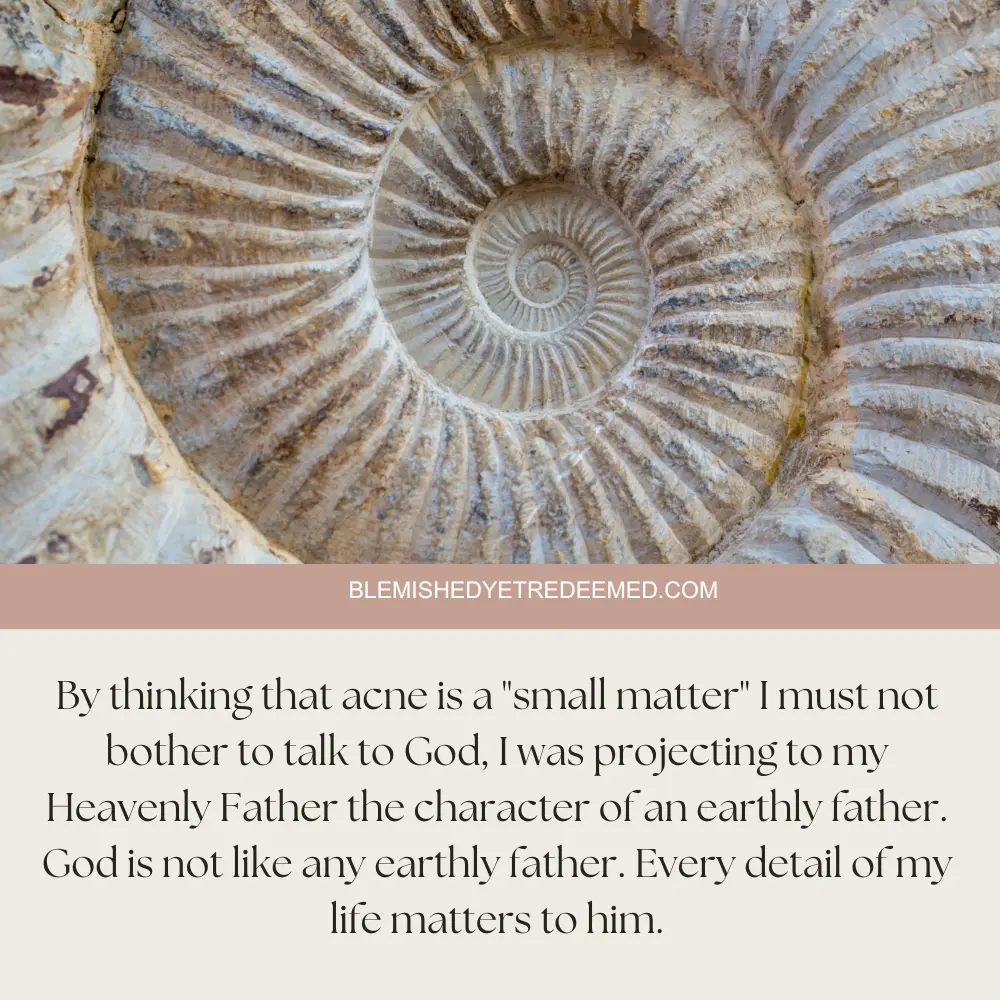Crazy Things I Shouldn’t Have Believed as a Christian Dealing with Acne Part 1

As a Christian dealing with acne, I found myself navigating not only the physical struggles but also the spiritual and emotional complexities that accompanied them.
Peeling back the layers of my acne struggle revealed misconceptions that I naively held as truths.
They were seriously distorting my beliefs about the character and work of God, and His love and grace toward me.
One morning, I was listening to a Truth Over Tribe podcast, when the guest for the episode, Juli Slattery, spoke about dualism.
Juli said, “Dualism [is a] philosophy that our bodies don’t really matter. It’s our spirit that matters. And so spiritual people don’t talk about bodily things because God doesn’t really care about that stuff.”
This split view of life hindered my journey toward physical well-being and spiritual maturity as a Christian dealing with acne. I never integrated these two things as one unit. I always viewed them separately.
The crazy things I believed were rooted in dualism—an unbiblical and unhealthy approach in life that only hijacked my emotions and clouded my perspective.
Hindsight is 20/20, and how I wish I knew sooner that I had this dualistic mindset.
However, I am still grateful that my fragmented approach to life was dragged into the light, allowing God’s truth to penetrate the darkness and renew my mind.
The thing is Christians subconsciously fall for dualism, and we have to consciously confront it.
For the first part of this series, here are the three crazy things I shouldn’t have believed as a Christian dealing with acne (and I strongly recommend you shouldn’t believe them too!):
#1 Acne is a trivial, vain concern.
When I decided to follow Jesus, I knew that was the time to dethrone my idols.
The worst idol I had was my golden calf of self—I craved both admiration and envy from others.
To make sure I wouldn’t fall again into my tendency to self-glorify, I cared less about my appearance.
Unfortunately, I took it to the extreme.
One of my grave mistakes in life was to conclude that the way to care less about my appearance was to devalue my body.
If I find myself more concerned with anything about my body, then I am “unspiritual.”
What counts as spiritual is attending to the more important matters of the soul and the spirit.
Placing a lower value on my body made me emotionally struggle with acne unnecessarily.
For many years, I believed I would have been more “spiritual” if I just accepted my skin. And that as a Christian, this concern was just too trivial for me to be worried about.
However, whenever I find myself fed up with “trying not to be vain,” I would spend countless hours watching YouTube videos, reading articles, and searching product reviews.
I would scour physical shops and online stores to look for acne products, desperately hoping they would work.
Sadly, they often overpromised and underdelivered.
And that would send me into a downward spiral with the immense guilt that I should have spent my time, money, and energy on “more spiritual” things.
I was caught in this loop of self-criticism for more than a decade, not exactly sure how my Christian faith could truly comfort me.
But looking at the gospel intently helped me to throw away my false conclusion.
The gospel proclaims the redemption of the whole person—spirit and soul and body.

The spirit is revived from the dead works of sin to yearn for Christ (Col. 2:13), the soul is made holy through the ministry of the Holy Spirit (2 Thess. 2:13), and the body of the believer is to be a living sacrifice and will be resurrected into a glorified one (Rom. 12:1; 1 Cor. 15:42).
And for the meantime that I am in my natural body, a body that is prone to physical weakness and disease (1 Cor. 15:42-44), I have a duty to nourish and cherish it (Eph. 5:29).
The body does not have a lower value compared to the soul and spirit as all three make up the “image of God” in us.
#2 Minimizing my pain would impress God.
If I had a healthier, more biblical approach to my acne experience, I would have preached the gospel to myself and understood that its rich, spiritual truths do speak practically to my circumstance.
The gospel does not proclaim that I minimize my pain and prove my spirituality so I can impress God, proving how “faithful” I am despite struggling with acne.
The gospel declares it is Christ’s finished work on the cross that saved me, not my attempts or works.
The gospel tells me to unshackle myself of the burden of self-condemnation and stand on God’s grace.
I should have realized sooner that God would have found me more faithful if I honestly and openly told Him that acne bothered me and asked for His wisdom and guidance in navigating my acne experience.
By categorizing acne as an issue that I don’t need to address because I am a Christian, I approached the situation alone, indirectly telling God I didn’t believe He would take care of this matter.

I did not see Him as He is—my Heavenly Father who is deeply interested in me (Ps. 139 1:4).
But the gospel tells me otherwise. I am a child of God, and my Father loves me (1 John 3:1).
That gospel truth reminds me that there is nothing too insignificant in my life that my Father is not willing to pay attention to.
By thinking that acne is a “small matter” I must not bother to talk to God, I was projecting to my Heavenly Father the character of an earthly father. God is not like any earthly father. Every detail of my life matters to Him.
I can take every care and worry to Him, even though I tend to downplay them a lot (1 Pet. 5:7).
#3 Acne is just a cosmetic issue.
Although acne has a cosmetic component to it, first and foremost, it is a medical condition. It is an inflammatory disorder of the skin.
Because acne is so closely tied to appearance, I internalized the message that it is ridiculous to take it seriously.
This messaging stems from the fact that acne, except for rare circumstances, is not life-threatening.
When I was younger, I never heard of acne medication, but I was bombarded with advertisements of cosmetic products claiming they clear blemishes.
Perhaps, it’s the very reason that acne is not life-threatening that compelled companies to use marketing strategies that emphasize insecurity and aesthetics.
This leaves people without acne clueless about the struggles of those who experience it: acne physically hurts.
It gives itching, throbbing, pulsating, and aching sensations.
In my case, it can be painful to smile, talk, and eat when I break out on my chin and mouth area. Even at rest, I can still feel they hurt.
Although my acne has always been mild since I was 15, it has persisted to my adulthood.
Looking back at my teenage years and twenties, I only had very few vivid glimpses of joy.
My decisions and activities were entirely dependent on the condition of my skin.
The desperation to clear my skin and the obsession to hide the blemishes were mind-numbing and exhausting.
The fears of not being able to attract a potential partner, being in conversations where my skin is the topic, and being exposed to people when my skin is acting up pushed me to be socially avoidant and isolated.
It was no fun way to live.
Yes, it didn’t kill me, but it paralyzed me mentally and emotionally.
I felt so alone in my struggle. I felt I had no one to turn to.
I thought I had no right to complain because acne is only a cosmetic issue.

I was afraid if I confided, people would only scoff, “You must be very vain to let acne affect you that much. Your acne isn’t that severe anyway.”
And that was my worst fear: If I were really vain, then I am not spiritual. I’m a bad Christian.
I couldn’t believe how this triggered a domino effect. It prolonged and intensified the emotional toll I experienced.
Therefore, believing acne is just a cosmetic issue denies the scientific facts that it is a medical condition that can cause depression and anxiety.
Managing acne is not merely a cosmetic treatment. It is medical care both for the health of the skin and the mental state of the individual experiencing acne.
Realizing this helped me to see I wasn’t vain or unspiritual.
My desire to take acne under control is a healthy desire to get into a place of well-being. And I didn’t need to be ashamed of that.
It was so critical for me to disentangle my Christian faith from my false beliefs:
- Acne is not just a cosmetic issue.
- Minimizing my pain doesn’t prove my faithfulness to Christ.
- Attending to one’s appearance isn’t always vanity. The body also needs care the same way I care for the health of my soul and spirit.
In conclusion, my false beliefs didn’t make me more Christ-like. They only made me more miserable because what I thought was self-denial was not self-denial at all.
Trying to ignore my acne in order to prove to God I was spiritually mature was foolish.
Self-denial must have pointed me to the power and wisdom that are in Jesus, instead, I relied on my own strength, on my own understanding (Prov. 3:5).
This is it for Part 1! I will be sharing more in Part 2. I will unravel more layers of my emotions and thoughts that got me stuck and stunted.
May this article encourage you to dissect your heart, so you can confront the beliefs that hold you back in your acne and faith journey with the truth and wisdom of God’s Word.
P.S. If you want to read more about Christian Dualism, I recommend this resource from Dallas Baptist University. And here is the link to the Truth Over Tribe podcast episode that I mentioned in this article.


